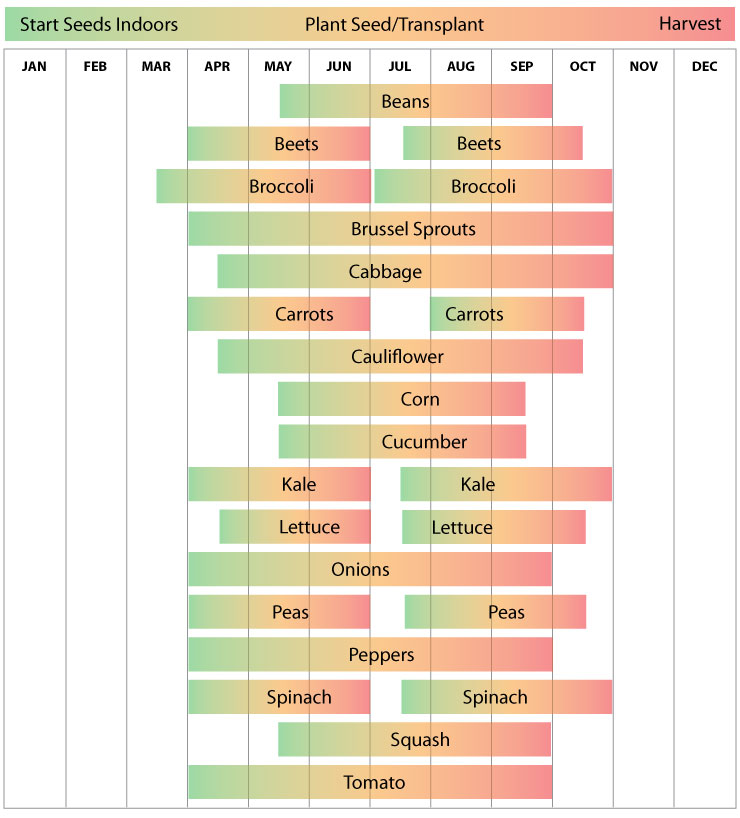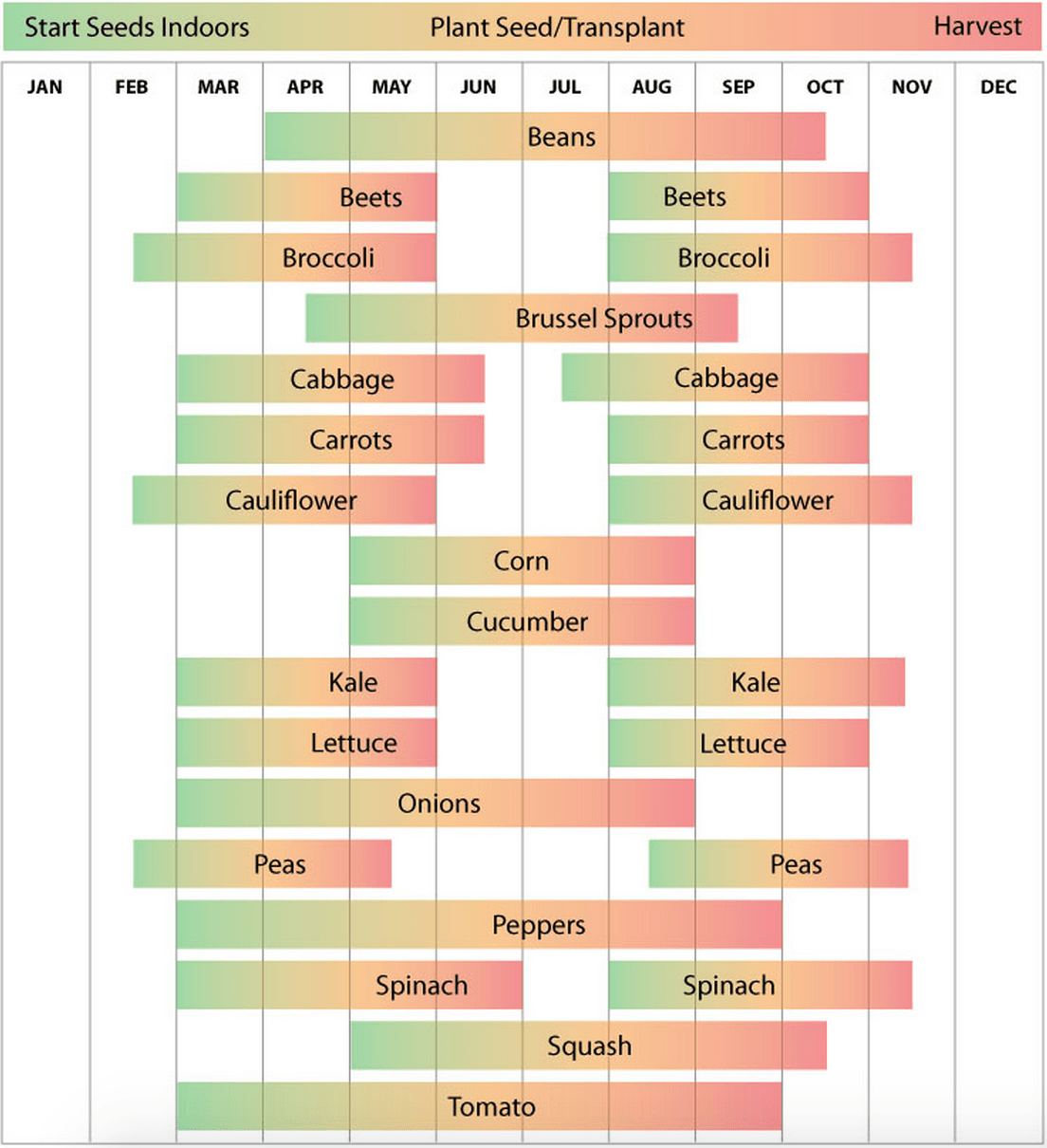Extend Your Harvest: Planting Vegetables in August for Zone 6
Imagine crisp autumn air, the leaves just beginning to turn, and you're harvesting fresh, flavorful vegetables from your garden. This dream can be a reality with a little planning and the right selection of vegetables planted in August in Zone 6. Extending your growing season into the fall not only provides a continuous supply of homegrown goodness but also allows you to enjoy cool-weather crops that simply don't thrive in the summer heat.
August planting in Zone 6 offers a unique opportunity to cultivate a second harvest of delicious vegetables. With the summer heat waning and cooler temperatures on the horizon, many vegetables flourish during this transition period. Knowing what to plant and how to care for these late-season crops is key to maximizing your autumn harvest.
Historically, extending the growing season has been a vital practice for gardeners seeking to preserve food for the winter months. Techniques like successive planting and utilizing cold frames allowed gardeners to enjoy fresh produce long after the summer harvest had ended. Today, August planting in Zone 6 continues this tradition, allowing us to enjoy the bounty of the garden well into the fall.
One of the primary considerations for August planting in Zone 6 is understanding the first frost date. Typically, the first frost occurs in mid to late October in this zone. Therefore, selecting vegetables with a shorter maturation period or employing techniques like row covers to protect against frost is crucial for a successful harvest. Calculating days to maturity from your anticipated first frost date will help you choose the right vegetables for your fall garden.
Choosing the appropriate vegetables for August planting in Zone 6 is paramount. Fast-maturing crops like spinach, lettuce, radishes, and turnips are excellent choices. These vegetables can be sown directly into the ground in August and will be ready for harvest before the first frost. Other vegetables, like broccoli, cauliflower, and cabbage, may need to be started indoors in July and transplanted into the garden in August.
For a thriving fall garden, understanding the specific needs of August-planted vegetables is important. Providing adequate water, especially during dry spells, is crucial. Additionally, amending the soil with compost or other organic matter will improve drainage and provide essential nutrients for healthy plant growth. Pest control is also a factor to consider, as some insects are more active in the cooler autumn months.
Benefits of August Planting in Zone 6:
1. Extended Harvest: Enjoy fresh vegetables well into the fall, supplementing your summer crops and providing a continuous supply of homegrown produce.
2. Ideal Growing Conditions: Cooler temperatures and shorter days create ideal growing conditions for many fall vegetables, leading to sweeter and more flavorful produce.
3. Reduced Pest Pressure: Many common summer garden pests are less active in the fall, resulting in less damage to your plants and a reduced need for pesticides.
Action Plan for August Planting in Zone 6:
1. Determine your first frost date.
2. Select appropriate vegetables based on days to maturity.
3. Prepare your garden beds by amending the soil and ensuring proper drainage.
4. Sow seeds or transplant seedlings according to recommended spacing.
5. Water regularly and monitor for pests.
Best Practices:
1. Soil Testing: Test your soil to determine its pH and nutrient levels, and amend accordingly.
2. Succession Planting: Sow seeds every few weeks to ensure a continuous harvest of fast-maturing crops.
3. Pest Control: Implement preventative measures like companion planting and regular monitoring to minimize pest damage.
4. Watering: Water deeply and consistently, especially during dry periods.
5. Mulching: Apply a layer of mulch to retain moisture, suppress weeds, and regulate soil temperature.
Examples of vegetables to plant in August in Zone 6: Lettuce, Spinach, Radishes, Turnips, Kale, Carrots (for early spring harvest), Beets, Bush beans
Challenges and Solutions:
1. Early Frost: Use row covers or cold frames to protect plants from unexpected early frosts.
2. Pests: Implement natural pest control methods like companion planting and beneficial insects.
3. Disease: Choose disease-resistant varieties and practice crop rotation.
4. Bolting: Select bolt-resistant varieties and provide adequate shade during hot days.
5. Short Growing Season: Choose fast-maturing varieties and consider starting seeds indoors.
Advantages and Disadvantages of August Planting
| Advantages | Disadvantages |
|---|---|
| Extended harvest season | Risk of early frost |
| Cooler growing temperatures | Shorter daylight hours |
| Reduced pest pressure | Some crops may not reach full maturity |
FAQs:
1. What vegetables can I plant in August in Zone 6? Leafy greens, root vegetables, and some brassicas are good choices.
2. When is the first frost date in Zone 6? Mid to late October is typical.
3. How do I protect my plants from frost? Use row covers or cold frames.
4. What are some fast-maturing vegetables? Radishes, spinach, and lettuce mature quickly.
5. Can I plant tomatoes in August? It's too late for a full tomato harvest.
6. What is succession planting? Sowing seeds every few weeks for continuous harvest.
7. How often should I water my fall garden? Water deeply and regularly, especially during dry periods.
8. How can I extend the harvest even further into the fall/winter? Consider using cold frames or even a small greenhouse.
Tips and Tricks: Consider planting cool-season herbs alongside your vegetables. Basil, parsley, and cilantro enjoy the milder conditions of late summer/early fall. Using raised beds can help extend the season as the soil warms up faster in spring and retains heat longer in the fall.
Planting vegetables in August in Zone 6 is a rewarding way to extend your harvest and enjoy fresh, homegrown produce well into the fall. By carefully selecting appropriate varieties, preparing your garden beds, and following best practices, you can ensure a bountiful autumn harvest. From crisp lettuce and spinach to flavorful root vegetables, the rewards of August planting are plentiful. Embrace the opportunity to extend your growing season and savor the flavors of fall. Take advantage of the cooler temperatures and shorter days to cultivate a garden that thrives in the transition from summer to autumn. Start planning your August garden today and enjoy the delicious rewards of your efforts. Remember to check your local frost dates and select varieties that will mature before the first frost. With a little planning and effort, you can enjoy a vibrant and productive fall garden. The crisp air, the changing leaves, and the satisfaction of harvesting your own fresh vegetables - it's an experience worth cultivating.
Last chance county your next book obsession
Decoding the foxs pizza oxford ms menu a deep dive
Crafting your epic identity a guide to fortnite usernames













